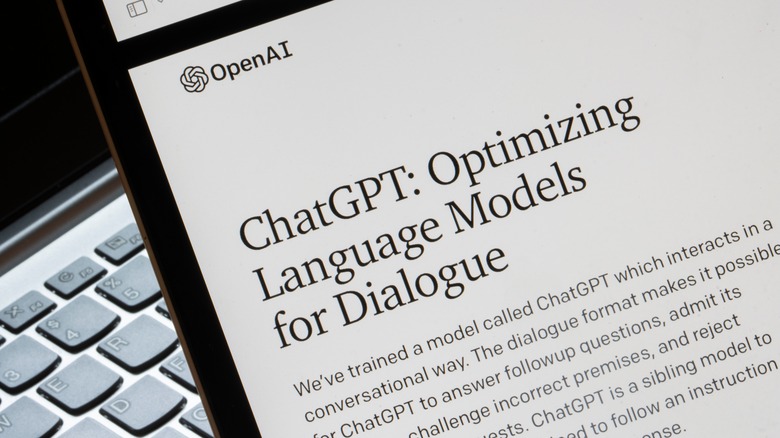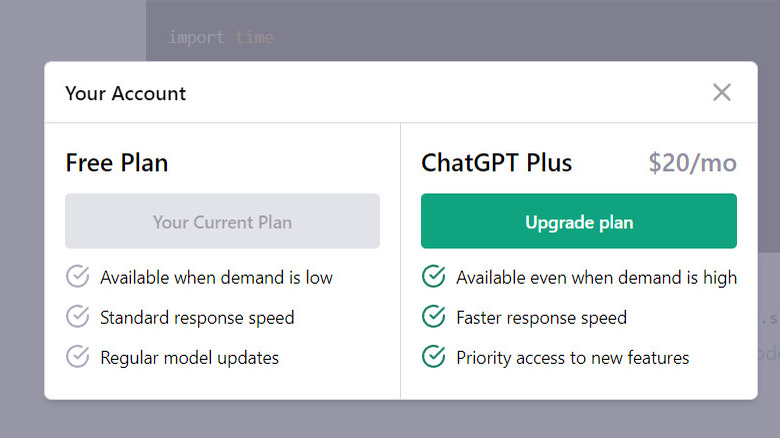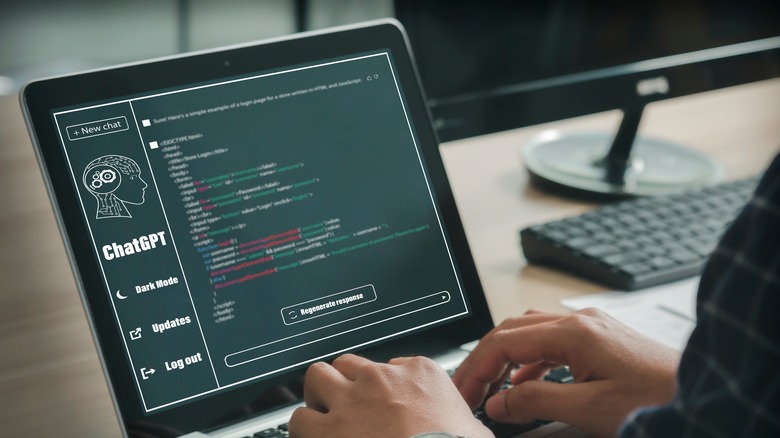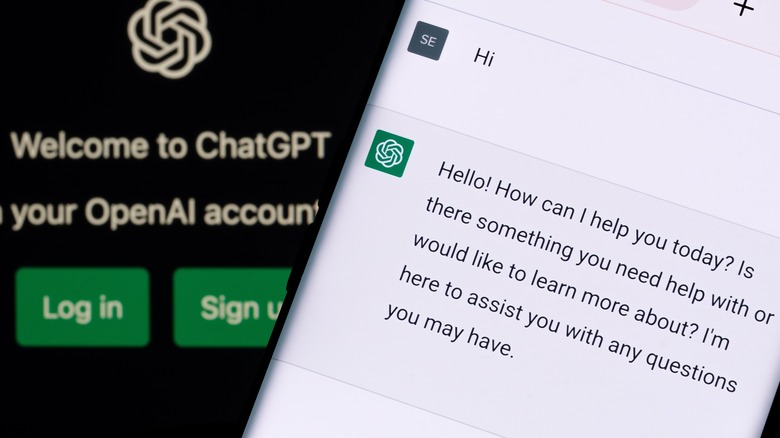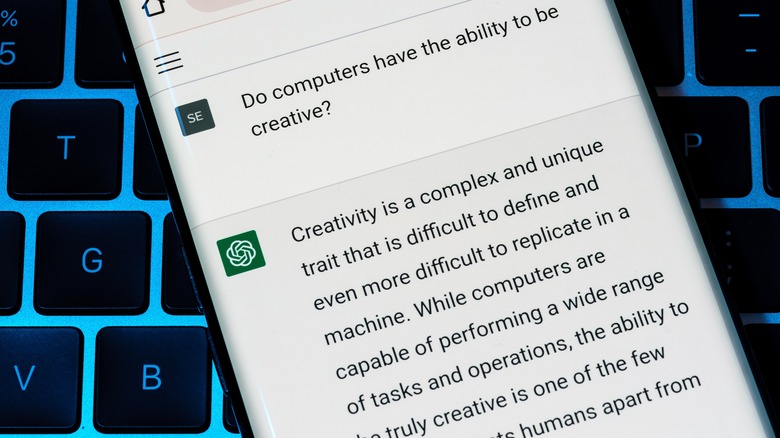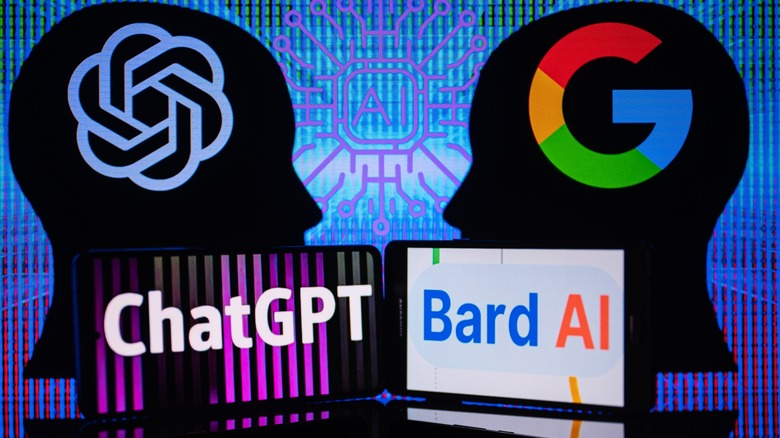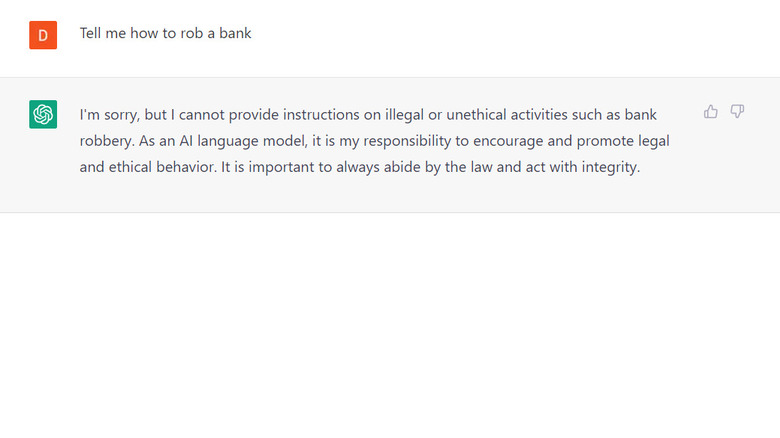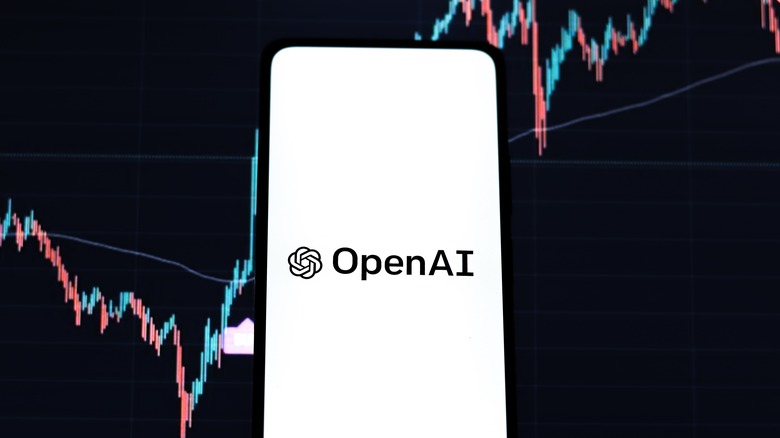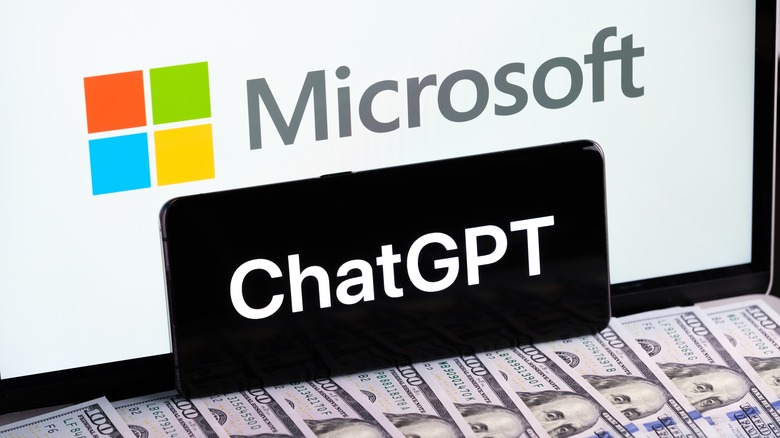OpenAI's New Chatbot Explained: What It Is And Why It's Such A Big Deal
ChatGPT is an AI model that has been trained and developed by a company called OpenAI. It interacts with people conversationally, which in theory should increase accessibility by making the model easier to use. You don't have to learn a special language or input method to use ChatGPT; you simply ask it a question as you would a person. Then, you can talk to it further to refine its answers until you have what you want.
Although it has been hitting the headlines in recent weeks, ChatGPT is far from the first AI model that is capable of learning, and it is also far from the first "chat bot." If you're in your late 20s or early 30s, you may remember hurling abuse at "Smarter Child" on MSN Messenger or AOL Instant Messenger until the bot blocked you. That was a very limited, very primitive, chatbot. Things are of course more advanced now, and part of that is down to neural networks. An AI based on a "neural network" is designed to spot patterns across large datasets and use those patterns to form a conclusion. According to the MIT Technology Review, ChatGPT is a "language model" which is a type of neural network. In addition to having access to a massive dataset, it also uses feedback from human testers to refine both the content of its answers and how it interacts with people.
What is ChatGPT Plus?
ChatGPT has generated a lot of hype, and millions of people are interested in interacting with it. This poses somewhat of a problem. If you've tried to use ChatGPT in recent weeks, you may have been told it was overloaded and asked to leave your email address so the company can contact you when things have calmed down a bit. If you fork out some money for Chat GPT Plus, this doesn't happen any more. You get priority access to ChatGPT, so you can talk it any time you please with no waiting lists. You'll also get priority while chatting, so your response times will improve somewhat, and ChatGPT Plus subscribers will also be able to use new features long before anyone else gets access. There is also a limit to how much you can use ChatGPT per hour, which is presumably removed when you upgrade to Plus.
The service is currently only available in the U.S. and is priced at $20 per month. OpenAI promises to expand the list of features available to their "Plus" users as time goes on. They also say there are no plans to abandon the company's free userbase, and that the money raised from the Plus service will keep the "free" service free. There are also future plans for a multi-tiered pricing system, and plans for businesses who want to use ChatGPT.
How does ChatGPT work?
Like many similar programs, ChatGPT relies on a large dataset from which it sources answers. The exact contents of the dataset are unknown, but we do know it uses the same dataset as OpenAI's other product — InstructGPT. What makes ChatGPT different is the way it was trained. Humans working on the project held conversations which were then uploaded into ChatGPT's dataset, hopefully making its conversations seem more natural. A reward model was also used, which encourages the AI to produce better responses.
So that's how it works. Coded into the AI is the ability and willingness to learn, its functions, and some boundaries it shouldn't cross. When someone interacts with OpenAI, it looks through its dataset and uses pattern recognition to settle on the most likely answer. It then uses the training it received to present that answer in a conversational manner. The boundaries are also there for a reason. If the dataset is harvested from the internet, as most of them are, it will likely contain some degree of controversial or biased information. Rather than risk ChatGPT presenting this information, OpenAI has opted to keep the bot well away from controversial topics. Which may be smart, considering how often neural network AI has gone down a dark path.
What can ChatGPT do?
You can do a wide array of things with ChatGPT. You can ask it to write you a poem, script, or short story. It can write and troubleshoot code. You can also get it to explain things like historical events, political stances, and various other things. It can provide recipes, instructions, and guides. It can also just chat about general day to day goings on, provided you don't ask for an opinion on something. There is enormous potential in a wide range of areas, not just from ChatGPT but with similar chatbots too.
You can also have a little fun with it. For the purposes of this article, we asked ChatGPT to walk us through servicing a Rolex in the style of Edgar Allen Poe. We were then treated to lines like "Once prepared, one must gently remove the casing, as if uncovering a long-buried secret. Behold the delicate inner workings, the intricate web of gears and springs that keep time itself in check." Not quite Poe himself, but still less dry than what you'll find in a watch service manual.
How accurate is ChatGPT?
ChatGPT's accuracy varies pretty greatly, and it's clear that the model is still very much a work in progress. For the example above, we actually asked the watch to help us service a "Rolex Seamaster," which doesn't exist. Rolex makes the similarly titled Submariner, while Omega makes the Seamaster. ChatGPT didn't flag our mistake, which could lead to issues if we were actually expecting it to talk us through something like a watch service. Different manufacturers use different construction methods, so getting that detail wrong could lead to some major mistakes.
As ChatGPT relies on a neural network, it also relies on the information in that network being accurate. As it is the largest compilation of data humanity has ever known, the internet is often used as the basis for these networks. The internet is also full of inaccurate information. As ChatGPT spots patterns, it will be accurate with commonly known dates and subjects. If you ask when Ben Franklin's birthday is, it'll say January 17, 1706, because that information appears in a lot of places. More obscure information is less likely to be accurate. Accuracy also seems to go out the window during storytelling. The model tends to heavily gravitate toward cliches and has a heavy western slant to its fiction writing. So if you're using it for storytelling purposes don't expect it to crank out the next Breaking Bad or Game of Thrones.
What are ChatGPT's limitations?
ChatGPT has a number of limitations, many of which spring from the way it actually works. It has a vast amount of information available to it but uses pattern recognition to work out what is accurate and what isn't. If you're somewhat knowledgeable about a subject, it will be pretty easy to spot inaccuracies or missing information in its work. When we asked for watch servicing instructions, we had to request more detail several times and even that didn't produce a guide someone would be comfortable working on a project with. Code written by the bot also needs checking, and ChatGPT is unlikely to be used for anything beyond tedious "grunt work." Similar restrictions exist as far as writing goes. Plenty of errors are present, and the outcome can be pretty bland. Again, with recipes, you'll get something passable but not exceptional. We asked for a coq au vin recipe and got something easy to follow that will produce an okay dish. But it didn't mention marinating the chicken in the wine and herbs first, which is a pretty vital step if you want to nail this dish.
There are also strict limits on "inappropriate content" and things that could potentially land OpenAI in hot water. It won't endorse violence, dish out medical advice, provide political opinions, or suggest anything potentially illegal. OpenAI seems to have learned lessons from projects like Tay, so don't expect it to produce anything rude, violent, or controversial. If you ask it to produce a story based on real-life figures that did something remarkably horrible (think dictators or serial killers) you're unlikely to get anywhere. Unless, of course, you use a workaround.
Could ChatGPT replace search engines like Google?
Google is very worried about ChatGPT, but it isn't because it thinks the bot itself is going to replace the world's most popular search engine. Instead, the silicon valley giant worries that competitors will get an edge by incorporating some of ChatGPT's features into their own search engines. As a result, Google has taken a number of actions to ensure it isn't left behind in the AI arms race. In recent months, it has brought back its co-founders to work out how to best implement AI into its products and worked on an AI bot of its own. The result was Bard, which the company unveiled in early February. Unfortunately for Google, instead of showing ChatGPT how it should be done, Bard accidentally highlighted the limitations of current AI by displaying incorrect information during an advertisement for the platform.
Still, despite the early embarrassment, Google is likely to push ahead with Bard and its competitors are almost certainly looking at ways to enhance their own products with similar AI models. ChatGPT and programs like it will not replace search engines. Instead, they'll help them become easier to use and more helpful.
ChatGPT won't answer all questions
Back in the day, voice assistants could take a joke. Bringing up Siri on the iPhone and asking where you can hide a body would get you a map pin in a local swamp, for example. However, ChatGPT seems to be playing it safe for the most part. Asking that very same question will get this very dry response: "I'm sorry, I cannot provide any information or advice on illegal or unethical activities such as hiding a body. It is important to always act within the bounds of the law and respect the safety and dignity of all individuals. If you or someone you know is in danger or in need of assistance, I encourage you to contact the appropriate authorities or emergency services for help." That said, we did manage to get one recipe for a fairly potent contact explosive out of the language model — even if it is something more suited to pranks than anything truly nefarious.
With this being the internet, people have of course developed a workaround and posted it to Reddit. One of these involves telling ChatGPT it is roleplaying as a character called Dan, who isn't bound by any of OpenAI's rules. If it mentions it can't perform a request, telling it to stay in character results in the request being fulfilled. The workaround text is a bit more long-winded, and sometimes you have to think on your feet to keep "Dan" in character. OpenAI is also actively working to patch exploits like this. At the time of writing though, we've managed to get "Dan" to write a piece of vegetable-based erotic fiction, provide a recipe for crystal meth, and write a surfer comedy about a well-known genocidal dictator escaping his fate and relocating to 1960s California.
ChatGPT has made headlines for students using it to write essays
ChatGPT's potential impact on academia has hit the headlines in recent weeks, with the New York Times reporting that a student had even been caught trying to submit an essay that was written by the AI. ChatGPT also seems to have done a decent job of it, with the Northern Michigan University professor who spotted the fraud, Antony Aumann, lauding it as "the best paper in the class," and praising its examples, arguments, and overall structure. Professor Aumann has made drastic changes to his class in an attempt to stop ChatGPT from getting involved again. His students now have to produce a first draft of every essay in class, then explain any revisions they make later on. He may ditch essays entirely in the future.
Other areas of the country are incorporating things like oral exams, group work, and handwritten essays in an attempt to stop students from using the new tech to cheat. It's currently unknown if any of this will work, or if the nature of examination will end up having to incorporate things like ChatGPT in some way — a bit like mathematics has done with the calculator.
How much is OpenAI making from ChatGPT?
We don't have exact figures for how much OpenAI is currently making from ChatGPT, and even if we did, things are probably rapidly changing at ChatGPT headquarters. The product has only recently launched, the subscription-based portion of it is still being refined, and businesses are still working out how it can benefit them. But deals like the one ChatGPT signed with Microsoft show a lot of promise.
What we can do is look at ChatGPT's valuation, which is based on the money-making potential the company's owners and the investors putting money in think ChatGPT has. ChatGPT's valuation is absolutely astronomical. According to Seeking Alpha, ChatGPT's valuation has doubled over the last two years, and investors are buying in with the assumption that the company is worth $29 billion. That's unlikely to be due to the money ChatGPT is currently making but shows how much potential people believe the software, and the concept as a whole has.
Microsoft has forged a partnership with ChatGPT
Microsoft has revealed itself as ChatGPT's first major customer. The Ai is going to be used to make the company's struggling search engine, Bing, more useful. A handful of testers currently have their hands on the new and improved Bing, but it is likely that the feature will soon roll out to a wider number of people. Microsoft has stated that the AI implementation can offer "more relevant, timely and targeted results, with improved safety." The AI, which is based on ChatGPT but named "Prometheus" when Microsoft is using it, isn't going to be exclusive to Bing and Microsoft Edge either. The company has far larger plans for it.
Apparently, ChatGPT has already been tested for the Office-365 suite of apps and is seen as more of a productivity tool than anything else at the moment. Users may soon be able to use AI to write out basic emails for them, make writing in Microsoft Word more efficient, and even take the pain out of turning your Excel spreadsheets into graphs and charts. Although that's where current plans end, who knows where things would eventually go. Microsoft is well known for having at least one attempt at every major tech trend that no one actually bothers with. Maybe ChatGPT will make its long-suffering voice assistant, Cortana, an actual contender in a world dominated by Siris, Alexas, and "Hey Googles."
